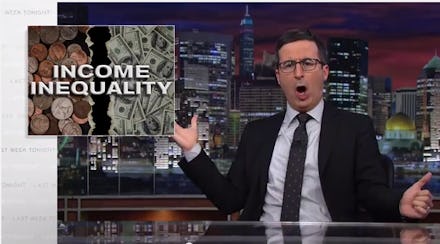Watch John Oliver Brilliantly Destroy the Myth of Economic Mobility in America

The news: In just 15 minutes, John Oliver perfectly summed up the utter absurdity of America's attitude toward income inequality.
The clip from Sunday's episode rips apart the myth that hard work is the solution to cutting down the wealth gap, and instead echoes what economists and CEOs alike know to be true: Inequality is a massive problem. Oliver argues that nobody wants to fix it because we foolishly believe we, too, will someday be part of the 1%.
"America now has a system where wealth is essentially dispersed as a lottery of birth," he says. The rationale for going along with it is our eternal optimism: "Maybe the reason we seem to accept that is that even though we know the odds are stacked against us, we all think we're going to win the lottery."
The segment ends with a live-action extension of the lottery analogy (starting at 12:15 in the YouTube clip), which illustrates just how difficult life is for poorer Americans in comparison to the wealthy.
His humor is grounded in a disturbing truth: Income inequality is a hot button issue, and there's good reason for that: It's real, and Americans are justifiably concerned about it.
Image Credit: Dorsey Shaw
According to a Pew poll from January, 65% of those surveyed believe that the gap between regular Americans and the wealthy has increased over the past decade. It's a bipartisan belief, too — the majority of Democrats and Republicans both said inequality is a problem.
Things have gotten so bad that even those at the top are speaking out. In June, Goldman Sachs CEO Lloyd Blankfein told CBS, "It's a very big issue and something that has to be dealt with."
Image Credit: Pew
Economists are also concerned. French economist Thomas Piketty recently made waves with his book Capital in the 21st Century, which argued that "inequality isn't an unintended consequence but an inevitable part of capitalism."
So what's being done? As Oliver pointed out, President Barack Obama has given some indication that he's well aware of the problem. What's less clear, however, is what he and other policymakers intend to do about it.
While the federal government and some states are languishing on the issue, cities like Seattle have raised their minimum wage to $15 an hour. Obama has also proposed an expansion of the earned income and child tax credits, which would largely benefit middle-and lower-class Americans; it's still waiting for Congress' approval.
The takeaway: Oliver sums it up perfectly when he notes that American optimism is partially to blame for the quagmire we're in. If the population continues to think that it can somehow, someday luck into striking it rich, things will never get better and the the 1% will keep reaping the benefits.
It's difficult to avoid sounding like a broken record, but until we start to see a shift in economic policy, it bears repeating: Income inequality is a severe problem, and it needs more of our focus than it's currently receiving.
Oliver may not be able to influence policy, but he can bring greater awareness, and that's a start.